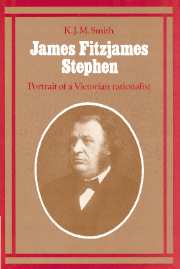Book contents
- Frontmatter
- Contents
- Preface
- 1 EARLY IMPRESSIONS: SIR JAMES, ETON AND CAMBRIDGE
- 2 A CONTROVERSIALIST IN THE MAKING: LITERARY CRITICISM AND LEADER-WRITING
- 3 A SCIENCE OF CRIMINAL LAW
- 4 ‘LAW LIVING AND ARMED’ – THE MECHANISM OF ENFORCEMENT
- 5 THE THREAT OF ‘HOOFS AND HOBNAILS’
- 6 INDIA AND THE IMPERIAL ETHIC
- 7 LIBERTY, EQUALITY, FRATERNITY: REFUTATION AND APOLOGIA
- 8 RATIONALISM'S BURDEN
- 9 THE BENCH AND BEYOND
- Notes
- Bibliography
- Index
5 - THE THREAT OF ‘HOOFS AND HOBNAILS’
Published online by Cambridge University Press: 30 September 2009
- Frontmatter
- Contents
- Preface
- 1 EARLY IMPRESSIONS: SIR JAMES, ETON AND CAMBRIDGE
- 2 A CONTROVERSIALIST IN THE MAKING: LITERARY CRITICISM AND LEADER-WRITING
- 3 A SCIENCE OF CRIMINAL LAW
- 4 ‘LAW LIVING AND ARMED’ – THE MECHANISM OF ENFORCEMENT
- 5 THE THREAT OF ‘HOOFS AND HOBNAILS’
- 6 INDIA AND THE IMPERIAL ETHIC
- 7 LIBERTY, EQUALITY, FRATERNITY: REFUTATION AND APOLOGIA
- 8 RATIONALISM'S BURDEN
- 9 THE BENCH AND BEYOND
- Notes
- Bibliography
- Index
Summary
Liberty, Equality, Fraternity, the great flowering of Stephen's political and moral philosophy, was produced during and soon after his return from India, marking a sort of midway point between the General View and the History. In it Stephen attempted to expose, almost in a ‘stream of consciousness’, the principal political life forces and moral currents responsible for the modern state. India was more the catalyst than the cause of Liberty, Equality, Fraternity; rather its origins lay in the decade surrounding the 1867 franchise reforms, events that compelled Stephen, along with many of his social and intellectual contemporaries, to examine closely and weigh his own beliefs on the proper direction and nature of parliamentary and popular democracy in England. It was a process of reassessment demanding deep excavations through several layers of social and political existence, involving Stephen rubbing shoulders with the most active and prominent figures of the day, all at least as concerned as he was with the nation's moral, cultural, and political destiny.
BENTHAMITE CHICKENS RETURNING TO ROOST
The crusading role of Benthamite utilitarianism as a force in generating the intellectual momentum leading to the 1832 Reform Act, along with subsequent legal and social developments, is common knowledge. The creed's strong attraction lay in its ability to slice through the confusions of tradition and prejudice congesting every facet of life: ethics, law and politics were all susceptible to utilitarianism's engagingly simple ‘greatest happiness’ formula.
- Type
- Chapter
- Information
- James Fitzjames StephenPortrait of a Victorian Rationalist, pp. 100 - 122Publisher: Cambridge University PressPrint publication year: 1988

